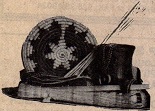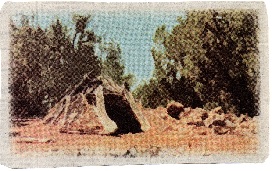Saad Bee Ál’íní (Alphabet)
A, B, Ch, Ch’, D, Dl, Dz, E, G, Gh, H, Hw, I, J, K, K’, Kw, L, Ł,
M, N, O, S, Sh, T, T’, Tł, Ts, Ts’, W, X, Y, Z, Zh, ’ (glottal stop)
|
|
Yá’át’ééh Marilyn Dempsey dashijní. Kiiyaa’áanii nishłí̜. Tó Dích’íi’nii báshíshchíín. Dibéłzhíní éí dashicheii. Hónágháahnii éí dashinálí. Kót’éego asdzá̜á̜ nishłí̜.

The Diné Bizaad page’s purpose is to provide an introduction to our indigenous language. Our language has been spoken by our people throughout time to communicate with one another, to sing, to pray, to express thoughts, and to think, plan, live, and reflect on our lives. Our great grandfather and leader, Chief Manuelito was quoted, “Shikéí, shidine’é, ałtah háási̜i̜łgóó… háadida léi’ nihizaad, nihisodizin, ádóone’é niidlínígíí dóó nihe’á’ál’í̜ nihił ch’aa wóle’ sha’áłchíní, hosídoolí̜i̜ji̜’, sidoołdee’ji̜’…” His words should not be forgotten and left by the wayside. So, it is up to each one of us to revitalize and maintain our dying language.
Indigenous languages have been utilized in wars of the United States. Our Diné language was used to win a war for this country. Just as the Code Talkers used our language as a weapon, we too must use our language as a weapon to protect our Diné Culture and values.
Diné Bizaad is one of the few indigenous languages left. We have not lost it all yet. Out of hundreds of indigenous languages pre-Columbus, there are less than 100 indigenous languages left that are spoken today.
Language is essential to the survival of a culture. Language and culture is essential to one’s self-identity, self-esteem, foundation, and success in life.
|
Táchééh
|
Táchééh éí ałk’idá͔á͔’ Diné chodayooł’í͔i͔go hoolzhish. Táchééh éí bee hats’íís chxiin ba͔a͔h nahgóó ájiił’i͔i͔h. Táchééh éí ha’a’ahjigo ch’é’étiin. Táchééh éí tsin dóó łeezh dóó azhííh bee ál’í͔.
Táchééh jigháahgo átsé éí beeldléí dóó tł’óół dóó łeezh bee hahalkaadí dóó ts’iilzéí bee ahaa neheezídí dóó tó bee naakáhí dóó tsé dóó chizh éí hasht’éjiił’i͔i͔h.
Tsé éí ko͔’diltłi’go biih jiinił. Tsé yéego daniidoigo éí tsé táchééh góne’ łeezh bee hahaalkaadí bee yah hajiijih. Diné éí táchééh góne’ yah ahi’nah. Táchééh éí tsosts’id da diné bóhóogah łeh. Diné táchééh góne’ dinibi͔i͔h dóó ch’é’étiin beeldléí bee dádílbał. Diné éí táchééh góne’ éí ła’ sodadilzin dóó dahataał éí nizhónígo hadoh dóó táchééh biká’adoolwoł biniiyé.
Diné éí t’áadoo le’é bida’diił’áhígíí táchééh góne’ chahałheełgo yaa nitsídaakees dóó yaa sodadilzingo naháaztá͔a͔ łeh.
|
Ła' diné éí binaanish da, bich’ooní yił ahínaaskéhígíí da, ólta’ da, bighandi anáhóót’i͔’ígíí da, adlá͔ da yiniiyé táchééh góne’ shiká’adoolwoł danízingo akóne’ yah adaakah. Táchééh góne’ éí diné ahá͔á͔h sodadilzin łeh.
Táchééh góne’ éí aláaji͔’ táchééh bik’ehgo ánééhígíí éí tó tsé sidoígíí yik’íizi͔’. Áko éí siil haleehgo bee yéego deesdoi haleeh. Kót’éego éí diné bits’íís chxiin nahgóó ba͔a͔h naa’oł. Diné táchééhdé͔é͔’ táa’di ch’ínájah dóó yah hanákah. Akée’di ch’ikah dóó nahasdzáán łeezh yee nída’ádíltsih łeh. Áko ndi k’ad ła’ diné doo ákódaat’í͔i͔ da.
Dinéjígo éí hastóí t’áá sahdii táchééh yijah dóó asdzání t’áá sahdii táchééh yijah. Ákót’éego éí baa áháyá͔.
|
Táchééh (Sweathouse)
|
Yah ahi’nah – they crawl into
Hasht’éjiił’i͔i͔h – one prepares
Dádílbał – to cover with a cloth-like material
Bi’diił’á – his/her concerns, problems, worries
Chxiin – dirt on the body
Yee nída’ádíltsih – dry themselves with
|

|
Saad Bóhoo’aah
|
Fill in the blank with the missing word. Practice using Diné words every day.
|
|
Yah ahi’nah
|
Diné táchééh góne’ __________.
(People crawl into the sweathouse.)
|
|
Hasht’éjiił’i͔i͔h
|
Bee na’anishí __________. (One prepares the tools.)
|
|
Dádílbał
|
Hataalgo hoghan ch’é’étiingi beeldléí __________.
(When there is a ceremony, the hogan entrance is covered with a blanket.)
|
|
Bi’diił’á
|
Hastiin binaanish __________.
(The man is concerned about his job.)
|
|
Chxiin
|
Níla’ __________ ba͔a͔h. (Your hands are dirty.)
|
|
Nída’ádíltsih
|
Táchééh bikéé’dóó diné łeezh yee __________.
(After the sweat, people use dirt to dry themselves.)
|
|
